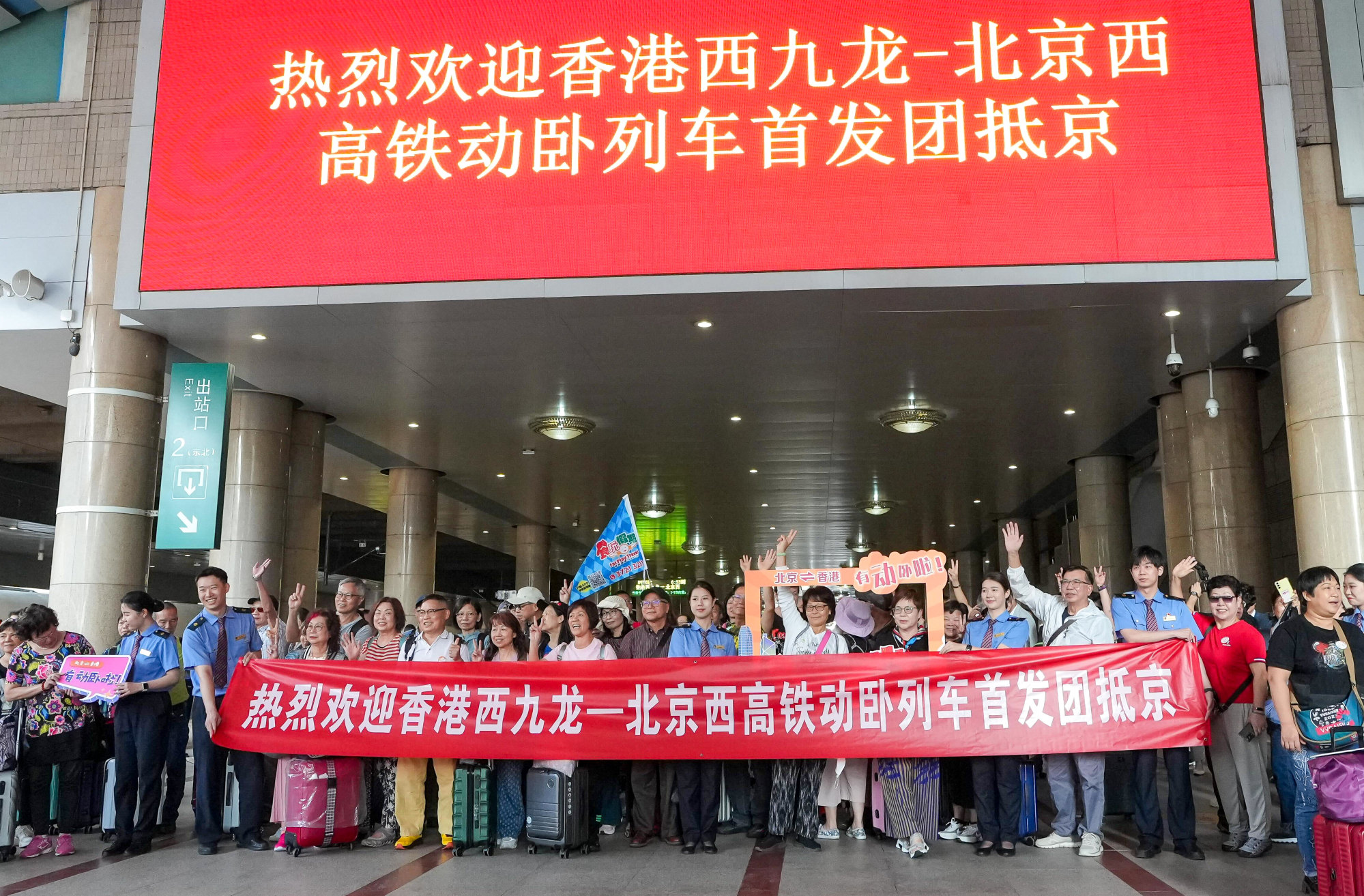
‘Hong Kong open to running more high-speed sleeper trains to mainland Chinese cities’
- Hong Kong transport minister Lam Sai-hung says more services possible if newly launched trains to Beijing and Shanghai prove popular
Train D910 reached Beijing West railway station at 6.53am on Sunday after departing from Hong Kong at 6.24pm the day before, with its arrival marked by a welcome ceremony attended by a cheering crowd of banner-waving passengers.
The train and another one that left for Shanghai from Hong Kong on the same day carried about 1,000 passengers in total.
Among those who travelled to the capital was Secretary for Transport and Logistics Lam Sai-hung, who said he had enjoyed a good night’s sleep and even woke up slightly later than usual at around 5.30am.
“[I] woke up [during the journey] but quickly fell back asleep. I am very satisfied with the design of the bed,” he said. “After waking up and freshening up, I realised I could also enjoy the surrounding scenery from inside the train.
“I even had a cup of coffee in the dining compartment. These are things that cannot be done in a typical plane journey.”
China Railway announced earlier in June that it would run overnight high-speed sleeper trains between Hong Kong, Beijing and Shanghai on Saturday, with the services to operate from Friday to Monday each week.
Asked whether the high-speed sleeper train services could be expanded between Hong Kong and more mainland cities, Lam said: “This is just the beginning, and the first step is to accumulate experience. The plan will be considered further based on the occupancy rates of the trains.”
“We need to strike a balance between the demand of passengers and the need for rail maintenance when considering increasing the frequency of the sleeper trains,” he said.
“Just like flights, we need to negotiate with different mainland units to decide whether a train can come or not. We will maintain close communications to better cater to the needs of passengers.”

Another passenger, Selina Lam Po-kam, said she slept better on the train than at home after falling asleep at 10.30pm on Saturday and waking up at 5.30am.
“I guess the slight shakes throughout the journey made me sleep deeper. I am so happy and excited about this ride,” the 65-year-old metal material trader said.
Lam said the train looked newer and offered more quality service compared with past sleeper trains she had taken to the country’s northeastern provinces from other mainland cities.
Rick Wong Wai-ki, a passenger who works in the food packaging industry, said he would stay in Beijing just one day for a business meeting and take another sleeper train back to Hong Kong on Sunday night.
“I love to take trains, even in Europe. I had an experience of staying on sleeper trains for 10 days. I am happy with the Beijing-bound train,” the 48-year-old said. “But it would be perfect if the terminus station had shower facilities for travellers to freshen up, like those in Europe.”
Timothy Chui Ting-pong, director of tour operator Eat Play Travel, joined a group of 47 people travelling on the train as part of a four-day trip. He said he had struggled to sleep, but considered the ride to be an experience.
The group of mainly elderly holiday-goers, including Chiu’s mother, will stay in Beijing for two days and spend the other two riding trains.
“Taking the first ever high-speed sleeper from Hong Kong to Beijing itself is already an experience. Taking it is a unique experience,” he said. “Not being able to sleep and taking my mother to meet new people will also be a unique memory for me.”
Chui, who is also executive director of the Hong Kong Tourism Association, said the high-speed sleeper trains could offer a more appealing travel option for families or even some young solo travellers.
Over at Shanghai’s Hongqiao station, the other high-speed overnight train from Hong Kong completed its maiden trip when it arrived in the mainland city at 6.45am after an about 11 hour-journey.
Most passengers said they were satisfied with the service, but some added they had trouble climbing up to upper berth beds.
Undersecretary for Transport and Logistics Liu Chun-san expressed his joy at taking the train to Shanghai.
“I slept for some time last night, which was still quite comfortable, while I was full of vitality,” he said.
The undersecretary said taking the high-speed sleeper train was better than sitting through similar journeys, but said he had not slept consistently in the night.
Lawmaker Gary Zhang Xinyu, who also rode the train, said the service allowed him to sleep more comfortably compared with flying, and also avoided the hassle of going to the airport hours in advance to check in.
“It is cosy to sleep on a train where I can arrive at the destination once I open my eyes,” Zhang said, describing the beds as spacious.
Wency Yuen, who works in the legal sector and slept in an upper berth bed, said it was her first time on a sleeper train, adding the toilets appeared to be quite clean.
“The bedding equipment was quite good, as slippers and tissues were provided for passengers,” the 35-year-old added.


